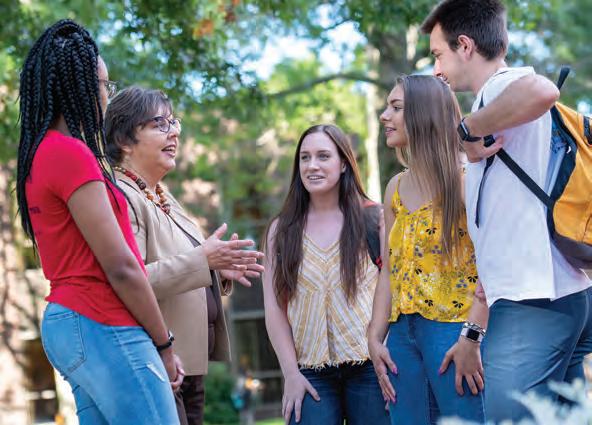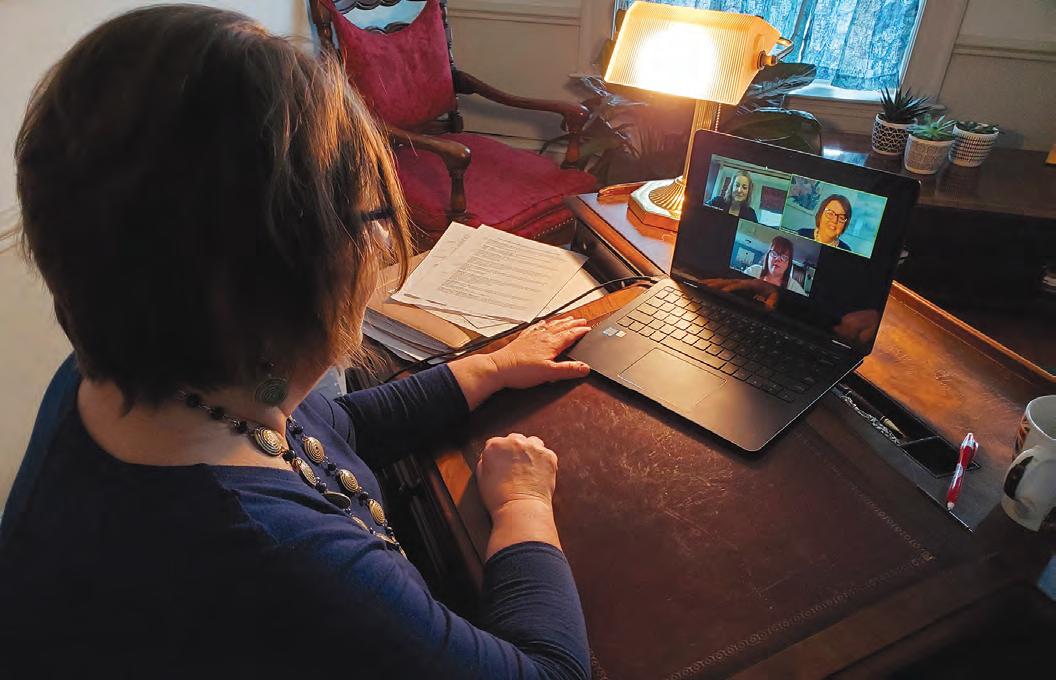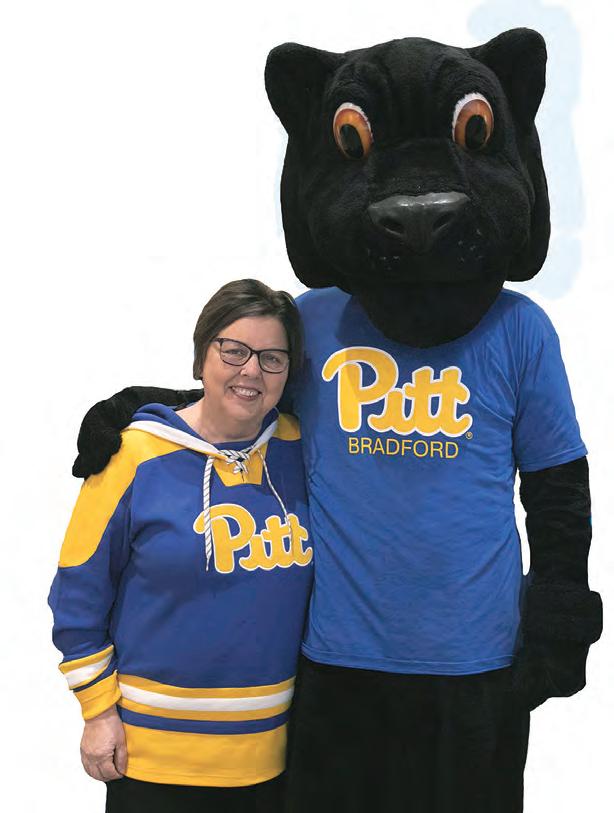
7 minute read
Freshman Year
FRESHMAN YEAR
Guided by commitment, ambition and idealism, new president Dr. Catherine Koverola leads Pitt-Bradford through the global pandemic
by PAT FRANTZ CERCONE
Talk about a baptism by fire.
As Dr. Catherine Koverola reached her seven month anniversary as Pitt-Bradford’s fourth president and was adapting to the complexities and challenges of the position, people in China were showing symptoms of a never-before-seen illness.
Two and a half months later, when COVID-19 became as familiar a term to us as influenza, Koverola found herself president of a campus from which nearly every student, faculty and staff member had left. Professors taught their students online. Librarians provided reference materials virtually. Staff members worked remotely.
“This was definitely not how I thought I’d be spending my first year as president,” Koverola said, “no, nothing like this.”
To stop the spread of the coronavirus, large gatherings all over the world were canceled or postponed, including this summer’s Olympic games in Tokyo, which were moved to 2021.
At Pitt-Bradford, as well as at other schools, that meant no commencement, no baseball, softball or tennis games, no Women’s History Month events or honors convocation. It also meant no spring inauguration for the new president.
“I was disappointed,” Koverola said, “but I started anticipating that it would be postponed probably before anyone else. I felt sad because so many people put a lot of effort into the planning.”

Koverola speaks with students last fall on campus in the Bromeley Quandrangle.
Matthew Lester
She was even more disappointed for those graduating seniors who were looking forward to commencement and celebrating with their family and friends. Instead of an in-person ceremony in the spring, faculty and staff pulled together an online version. “I’ve promised the students that when it’s safe to do so, we’ll have an extraordinary ceremony for them and their families.”
While Koverola was disappointed by the way the spring semester ended, she realized the cancellations and postponements were necessary.
“Our first priority is the health and safety of our campus community, our neighbors in the region and beyond, and all of our loved ones and friends.”
That became Koverola’s mantra as she soldiered through her first year as president during the global pandemic, the likes of which hadn’t been seen since the 1918 influenza pandemic.
As Koverola used her motherly countenance to encourage – often daily -- students, faculty and staff to stay safe and healthy, she herself faced an ever-growing, ever-evolving list of unprecedented challenges.
Before COVID-19, her to-do list was long but manageable: increase enrollment, retention and graduation rates; enhance and expand academic programs; create a campus on which everyone feels welcome; raise money for much-needed projects; and improve town-gown relations.
After the virus, her list grew in size and complexity: recruit students who couldn’t physically visit campus; help the students who felt disconnected stay engaged; keep everyone calm and focused during an unsettling time; prepare in the event a student or employee contracted the virus.
“This was a really scary time for everyone,” Koverola said. She was scared, too.
Amid the turmoil, Koverola worried about her loved ones, most spread throughout the world, including her mother in a nursing home near Vancouver and her daughter in England.
“I can’t focus on my fears, whether I’ll lose someone I love.”
When her fears bubbled up, as fears do, she faced them and tucked them away so “I could be the voice of reason and guidance.”
The global pandemic was not the first time Koverola has thought about disease and health care issues. Long before she assumed the presidency last June, she had been thinking about those problems as well as food insecurity, climate change and sustainability, and how to marshal young people to combat all those complex issues.

Koverola meeting with the staff of the president’s office via video conference while employees worked remotely.
The need to protect the planet became connected way, who have integrity and ethics. heartbreakingly clear to her while she was in Mauritius, a small island in the Indian Ocean of Madagascar, where she was serving as inaugural provost at the African Leadership University.
One morning she went to the beach for her daily swim, the day after a cyclone had hit the island, and was shocked by the plastic from all over the globe that had washed up on the white-sand beach: bottles, bags, containers, toys, syringes, a tangled mish-mash of detritus strewn along the shore.
Koverola realizes she’s in a unique situation to help, to lead Pitt-Bradford’s faculty and staff to prepare students to be good stewards of the earth and each other.
“The world needs agents for good,” Koverola said. “I want us to graduate students who are equipped for their future, who are ready to be a positive force for good. The challenges are immense, and we need people who think in a globally connected way, who have integrity and ethics.
Koverola wants us to change the world, but she knows change starts locally, as in campus locally. She’s deeply committed to making sure everyone on campus feels welcome, valued, respected and heard.
Anyone familiar with Pitt-Bradford’s history knows the campus has changed dramatically in nearly 57 years, from a fledgling, hodgepodge of buildings to a robust and vibrant campus community with an increasingly diverse staff, faculty and student body.
“Now, more than ever before,” Koverola said, “it’s essential that we all work together to ensure we are a welcoming campus where everyone feels respected, valued and included.”
All along, Koverola had intended to work with faculty, staff and students to create that kind of campus environment. The onset of the global pandemic didn’t alter or derail her intention. In fact, it made her even more resolute as she – and many others – saw how the pandemic illustrated even more clearly the inequities that still exist, both in the global community and at Pitt-Bradford.
“I am more committed than ever before to ensure that all of us at PittBradford work together to serve our students and the community, to make sure we provide equal access and opportunity for everyone.”
Creating that kind of campus environment means many things to many people. For Koverola, it’s an overarching idea that means people truly care for one another. They show compassion. They respect each other despite any differences. They offer support.

Kat Procyk
“As a leader, I want to help us all come together and support and care for one another,” she said. “As we do that, we all become better.”
During the pandemic, Koverola saw many examples of that support and care. Alumni bought pizza gift certificates and snacks to cheer up those students who couldn’t go home and remained on campus. One professor purchased face shields for campus police officers and area health care workers to keep them safe. Faculty, staff and donors quickly mobilized to create an emergency fund for students who needed help buying food or paying rent.
“The pandemic has shown all of us that we have the capacity to care for one another,” Koverola said. “Now we need to keep that going and build on it.
“I hope my constant effort to affirm our community is pulling out the best in people, which ultimately will make us stronger."
Koverola also is committed to helping students succeed by Pitt-Bradford’s tending to the whole student: mind, body and spirit. Yes, students will go to class, experiment in the lab, perhaps study abroad and work on an internship. But she also wants them to eat well, exercise, get enough sleep, participate in the arts to uplift their spirits, play on a team to help them build connections.
“We are at our best as humans when we’re physically well, emotionally well, and relationally and spiritually connected,” she said.
That’s not necessarily a surprising approach when you consider she was a clinical psychologist before becoming an academic and then developed a mindfulness studies graduate degree – the first in the United States – as dean of the Graduate School of Arts and Social Sciences at Lesley University in Cambridge, Mass.
She admits it’s not a new phenomenon. There already are activities on campus that contribute to that whole-person approach.
Koverola just wants to make it more intentional, show people the value of that approach and make the benefits clear to everyone.
What will that look like on campus? Perhaps a community garden. Maybe a climbing wall, which some students have already asked for. Definitely more healthy options in the dining hall such as organically grown produce.
The result, she hopes, will help students be healthier and happier, and enable them to develop good habits for life.
“We have a four-year chance to alter people’s lifestyle choices for the better,” she said, “so when they graduate, they’ll continue to make healthy choices and live their best life.”
So, for anyone keeping score, Koverola wants to develop students into people who will save the world; create a campus where everyone feels welcome; and tend to students’ minds, bodies and spirits. Oh, and keep everyone safe during a global pandemic.
Makes for an interesting first year.
“You bet,” she says with a wide smile, “but together we can do all that and more.”



